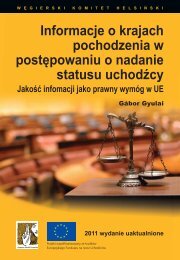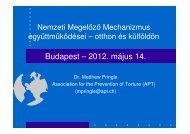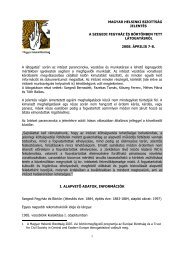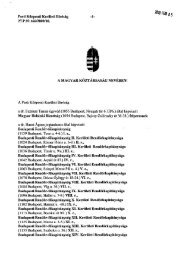English
English
English
You also want an ePaper? Increase the reach of your titles
YUMPU automatically turns print PDFs into web optimized ePapers that Google loves.
Standard 4 Transparent Processing and Communication of InformationThe Constitutional Court of Slovenia established in SI-11 thatSince the Ministry of the Interior did not enable the applicant to give his opinion on thefacts and circumstances relevant for the decision [including COI materials], it violated theapplicant’s right to the equal protection of rights, specified in Article 22 of the Constitution.The Slovenian Supreme Court also emphasised in SI-10 that the fact that[...] the determining authority examined several general COI materials obtained during theadministrative procedure, but did not present those information to the applicant was not inline with the [relevant provisions] of the General Administrative Procedure Act.Swedish jurisprudence follows the same line. The Migration Court of Appealcriticised in SE-06 that[...] the [lower-instance] Migration Court has neither presented from where [the COI used]was obtained nor added any material to the case that includes the information in question.The Migration Court has further based its judgement on this information without givingany of the parties an opportunity to state their views on it. Since this information that hasbeen added to the case cannot be regarded as of common knowledge, it should have beencommunicated, in accordance with [the relevant provision of] the Administrative CourtProcedure Act, at least to the applicant before the case was determined.The same court used a similar argument when quashing a lower-instance decision inSE-05, too. The Migration Court of Gothenburg also pointed out in SE-02 that[...] asylum seekers have the right, according to The Administrative Act, to have access toand respond to [the information in their case file]. This principle applies also to the relevantsections of country of origin information that form the basis of the Migration Board’s decision[...] [it is rare] country of origin information would be precluded from the public domainbecause of being officially classified [...] [Country of origin information] is of vital importancein order for the Migration Board to be able to correctly assess the accuracy and credibility ofasylum claims. Similarly, it is important for an applicant to have access to and to be able torespond to the information on which an administrative authority bases its decision.Slovak jurisprudence is also consequent in setting a standard of retrievability, theclearest formula of which was established in SK-13 by the Regional Court of Bratislava:The statements of an asylum-seeker must be considered in the light of country of origininformation. The first-instance authority is obliged to explain in its decision, which facts thedecision-maker took into consideration as basis for the decision and how he/she examined theavailable evidence.The lack of clear references to COI was further denounced by Slovak courts inSK-01 and SK-08.The Metropolitan Court in Hungary set a similar standard in its judicial practice.In HU-05, the Court used the term of “punctually referenced” COI and emphasisedthat the same norm is to be applied in this respect for proceeding authorities and legalrepresentatives:[...] it is not permissible to accept any reference of general nature, in the case of country oforigin information in view of the accountability and identification, the legal representativeshall indicate with proper references and details on which points it challenges the respectivepart of the administrative decision.65







